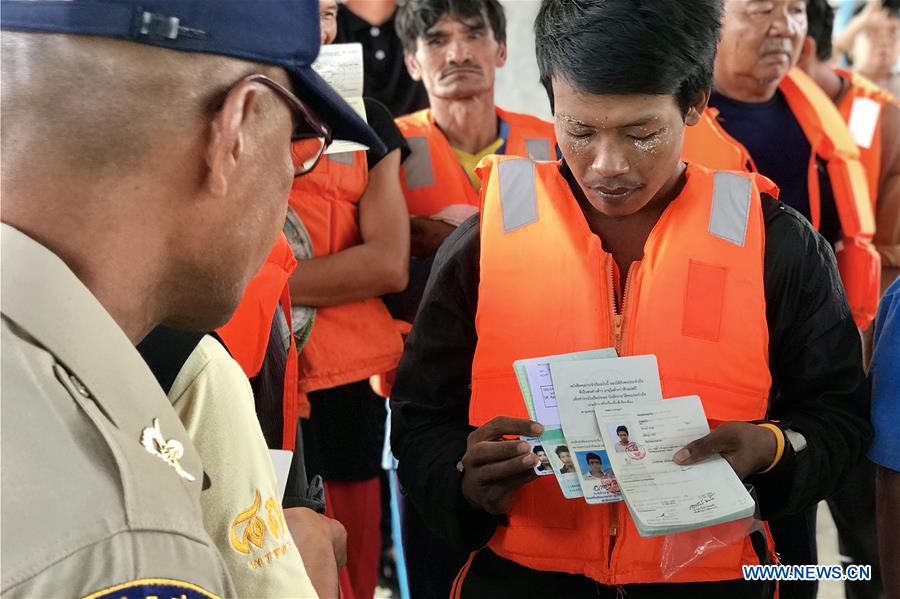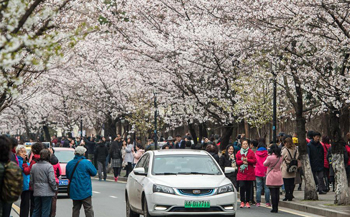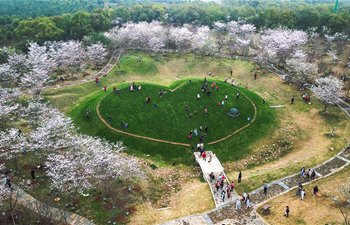 ?
?Migrant workers from Myanmar working in fishing industry show their personal documents, working permits to Thai officials in Samut Sakhon Province, Thailand, March 20, 2018. The Thai government has reiterated its determination to register and legalize all of some 3.8 million migrant workers from Myanmar, Cambodia and Laos by the end of March. (Xinhua/Yang Zhou)
BANGKOK, March 22 (Xinhua) -- The Thai government has reiterated its determination to register and legalize all of some 3.8 million migrant workers from Myanmar, Cambodia and Laos by the end of March.
The country started to provide legal services to foreign workers in early February by opening 80 One-Stop Service Centers nationwide to legalize them all, with the ultimate aim to erase human trafficking, child labor and forced labor in the kingdom.
"What we are doing is not making troubles for employers and migrants workers. We are making it easy for employers to employ legal workers, who can also work at any place in Thailand according to Thai laws," Anusari Thapsuwan from the Ministry of Labor of Thailand told a press conference in the province of Samut Sakhon on Monday.
She emphasized that the registration of migrant workers will also put them under the protection of Thai laws and create a sustainable environment for everyone concerned.
Thailand, due to its economic advantage to neighboring countries and aging society, has been attracting millions of migrant workers, predominately from Myanmar, Cambodia and Laos, to find employment here. Many of these workers work in the so-called "Dirty, Dangerous, Difficult" industries and many are illegal and thus vulnerable to exploitation.
The Thai government began to open 80 One-Stop Service Centers nationwide since early February in an attempt to legalize some 2 million migrant workers, who still lack legal documents here.
As of February 2018, a total of 3,809,519 foreign migrant workers are working in Thailand. Some 1.8 million of them are legal while the remaining need to go through the registration process to get work permit and visa to work legally in Thailand for two years until 2020, Minister of Labor Adul Sangsingkeo told Thai media.
These One-Stop Service Centers are comprised of staff from five government agencies, including the Department of Provincial Administration to collect personal date and issue ID card, the Immigration Bureau to renew the visa, the Department of Employment to issue work permit, the Social Security Office to register social security coverage and the Ministry of Public Health to provide medical checkup and health insurance.
"I came here at 5 a.m. this morning and it takes a long time," a Myanmar migrant worker told Xinhua at Samut Sakhon Hospital, which is the provincial One-Stop Service Center of Samut Sakhon, a province well-known for its fishing and seafood process industry.
Many Myanmar migrant workers, as over 90 percent of migrant workers in the province are from Myanmar, can be seen at the hospital waiting to go through the registration process to finally get legalized.
Everything can be done in a day and none of the workers need to come to the center for a second day, said Dr. Molee Wanichsuwan, Director of Samut Sakhon Hospital.
He told the media that the migrant workers are required to go through health check-ups and those found sick would be treated with their health conditions evaluated to see if they could continue working in Thailand or be sent back to their home countries.
Once registered, the foreign migrant workers would enjoy the same level of minimum wage and other social welfare. This will be guaranteed as employers are obliged to transfer wages to all workers through commercial banks.
During visits at several Thai factories with foreign migrant workers, both the employers and workers told the media that they consider the legalization of all migrant workers a good thing, though there may be some short-time impacts such as lack of workers as some may have to go back home to verify their nationalities.
Phet, who is from Savannakhet Province of Laos, told Xinhua that she is quite confident as she is a legal worker and protected by Thai laws.
She works at an egg process company KCF and her child is funded by the company to learn in Thailand.
According to the Thai government, some 537,494 migrant workers had passed through the registration process in these centers up to March 15.
The Thai government has asked all employers to take their employees from Myanmar, Cambodia and Laos, to register at One-Stop Service Centers before March 31, otherwise they will be fined or even jailed according to a new regulation of foreign workers promulgated last year.
Myanmar, Cambodia and Laos have also set up Nationality Verification Centers in Thailand to help speed up the process.
To take care of these migrant workers in the long term, the Thai government said they will also create training centers, assistance centers, hotline and special websites for them as they would all become legal and contribute to the economic growth of Thailand.















